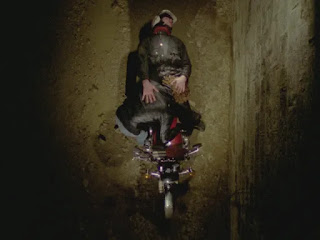I know, I know, yet another movie post but it's either this, or a coruscating discourse on the current state of American affairs, and if you need reminding of just how bad things have gotten in these not-so-United States of America then you probably won't like what I have to say on the matter anyway. But, oh, by the way, Trump and Melania have allegedly tested positive for the coronavirus. Soon enough, we'll find out whether or not Lady Karma is distributing a well-earned dose of belated justice to this most ignominious of pairs, or if it's another of DJT's desperate political ploys to sway, postpone or steal next month's election.
In any case, "Equation To An Unknown" (Equation a un inconnu), is a 1980 art/porn film directed by French painter, actor and cabaret owner, Dietrich de Velsa, a reclusive, mysterious figure who, under his real name (Francis Savel), worked with Joseph Losey on the mainstream films, "Monsieur Klein" and "Don Giovanni". While Savel is listed as co-director on those Losey films, "Equation" is apparently the only movie he directed himself, and it's a beaut. Set in the suburban squalor of an unrecognizable Paris, the movie follows a motorbiking young stud as he cruises the sporting fields, cafes, and back alleys for all the MLM sex he can get. And he gets plenty! Because the world of our generously endowed, unnamed protagonist consists (almost) entirely of alluring young men possessed with equally large penises and sexually adventurous spirits, all propositions are met with a come-hither glance and quick tug of the crotch. No one gets called out or beaten up for making an ill-advised pass because, in this world, there are no ill-advised passes: everyone has the same thing on his mind.
Obviously, since "Equation To An Unknown" is, first and foremost, a gay porn film (albeit an arty one), there's a lot of hardcore sex. But it's also a melancholy film, filled with a sense of loneliness and longing that permeates the action. While the main character has his youth, looks and a motorcycle (not to mention his pants-bursting accoutrement), his constant search for sex suggests a need for more meaningful connections. Indeed, when he murmurs "I wish I could love only you," to one of his partners, he seems to reveal a genuine (if fleeting) moment of self-realization before rushing off to be the centerpiece at an orgy.
As the film's protagonist, Giancarlo Longhi is both beautiful and strangely sinister, projecting an aura of mystery-bordering-on-menace when he assumes the role of voyeur. Additionally, there's a layer of world-weary apprehension that complicates this most itinerant character, but whether any of this constitutes an actual performance or is simply a reflection of his persona, Longhi is an ideal focal point for de Velsa's lens to capture the hypersexual essence of the era immediately foreshadowing the AIDS epidemic.
The rest of the cast includes names like Jean-Jacques Loupmon, Reinhard Montz, Jaime Sutherland, Djalil and Aurelien Duguet, among others, as various footballers, store attendants and blue-collar wanderers, stunningly captured in the glorious glow of youth. Incidentally (coincidentally?), a few of these characters resemble Longhi to the extent that, at times, I wasn't sure who was doing what to whom (not that this interfered with my enjoyment of the film). Comparing these guys to those in the William Higgins oeuvre (and other purveyors of American gay porn) of the same time period, is almost beside the point. The young men in "Equation" may have similar (slender, mostly shaved) builds but they're a more exotic bunch that wouldn't be out of place in either a Tom of Finland drawing or a John Rechy novel.
And yet, through it all, there is the inkling that all is not well. Even in this land of free-spirited, hail-fellow-well-met sexuality, there is every indication that something wicked this way comes. Of course, now we know. It wasn't some ignorant, knife-wielding closet case waiting in the wings to pounce upon our unsuspecting cast: rather, it's the spectre of AIDS lurking just offstage and waiting for an entrance cue. After the movie, I found myself wondering which, if any, of the performers (and director) survived that terrible period of our history.
Notwithstanding the drab surroundings, many scenes in "Equation" have a burnished quality, sort of like a painterly work from the Dutch Golden Age. De Velsa was an artist, after all, and while the Parisian locales reek of poverty and despair, the landscape vibrates with a clandestine ambience of desire and peril. Yann Gonzalez (director of 2015's excellent "Knife + Heart") has done a fine job restoring this nearly forgotten classic and has included some interesting bonus features on the disc, including an Alain Delon-narrated documentary on De Velsa's creative process (in this case a painting, not the movie at hand). By and large, "Equation To An Unknown" is a dirge at the end of an orgy: a ravishing, carnally-infused fever dream, touching and arousing in equal measures, that left this man of a certain age with a mournful afterglow.







Comments
Post a Comment